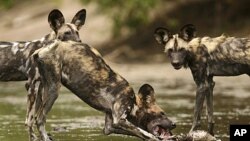Poaching of Zimbabwe's dwindling wildlife is at an all-time high, and for the first time poison being put in water holes in protected areas is killing animals and endangering people living nearby. Wildlife is Zimbabwe's main tourist attraction.
Zimbabwe's Parks and Wildlife Management Authority says that poachers have poisoned water holes in five national parks, killing at least 21 animals including lions and elephants, and that villagers living nearby are in danger.
Caroline Washaya-Moyo, spokesman for the parks authority, said poachers have developed new, "silent" techniques to kill animals, and that this was only discovered after the bodies of animals were found near water holes in some of Zimbabwe's most famous national parks last week.
National parks officials say this is the first time animals in protected wildlife areas have died from poisoning.
Peter Henning has been involved in wildlife management in southeastern Zimbabwe for many years.
He said although the poison had not yet been identified by government laboratories, he believed examination would find that a common poison known as "two step" was responsible for killing the wildlife and that this poison would continue to contaminate the area indefinitely.
"Sometimes [it is] called 'two step" meaning the animal once it consumes water with the poison in it takes two steps then it dies, very potent and that would mean the water in which it has been placed is permanently poisoned, it's very likely the mud itself is contaminated," said Henning.
Henning said there was massive destruction of Zimbabwe's wildlife taking place in several protected areas. He said he has specific evidence of destruction of wildlife in low lying parts of southeastern Zimbabwe near a small town called Chiredzi.
"I can speak of the Zimbabwe lowveld where there is complete devastation taking place at the moment," Henning added. "A number of conservancies, Chiredzi River Conservancy is willfully being invaded now at the encouragement of some powerful politicians and they are cutting down trees, and slaughtering the wildlife including elephant and rhino."
Henning said many animals were being poached, with wire traps being used to kill giraffe and deer. He said there was little evidence at present that guns were being used to kill wildlife.
He said the new poaching method, poisoning water holes, was incomprehensible in its cruelty. He said poisoned animals were a danger to birds and animals feeding on the carcasses as well as hungry people tempted to cook and eat the meat.
"It is depravity in its extremity you can't describe it in any other manner," said Henning.
National parks officials issued warnings to everyone including game rangers to carry fresh water with them and not drink from any of the watering places in the five protected wildlife areas affected by the poisoning.
Zimbabwe Wildlife Poisoned




